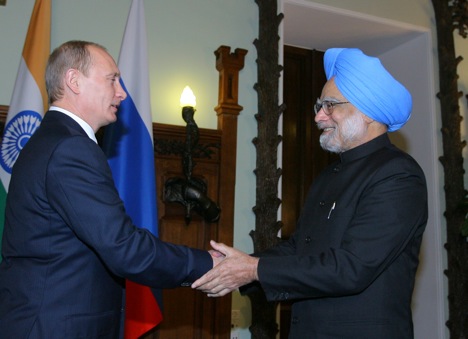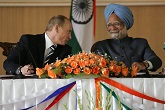Unwarranted meddling not welcome

Vladimir Putin has a good relationship with Manmohan Singh. Source: Konstantin Zavarzhin / RG
Ever wonder why every single one of India’s annual summits with Russia is considered a success? It is not just about the fact that there has been a great deal of goodwill between the leadership of both countries since the days of the Soviet Union. It’s more than the clear convergence of views on most global issues. That both countries want a multi-polar world is also not why these summits leave each side happy when the final agreements are inked. It is very clear that the Russian and Indian leadership appreciate the fact that neither side meddles in the internal affairs of the other country or gives patronising lectures.
In 2004, in the aftermath of the “Orange Revolution” in Ukraine, Vladimir Putin came in for a lot of criticism from western leaders and their media. Some “reputed” papers were even gloating that the Russian president was being seen as a diplomatic outcaste of sorts. That changed in a hurry when Putin was given the red carpet on his visit to Delhi and Bangalore. If the world’s largest democracy and a growing economic power gave the Russian president such a welcome, then obviously the idea of him being isolated went out the window.
A similar kind of respect goes a long way in warming up to the Russian people (many of whom are apolitical) as well. When I first moved to the country, I met a delightful young social activist who was very critical of both the regime of the time as well as the Soviet Union. During one of our long philosophical conversations, the topic of American foreign policy came up. She went on and on about America’s interference in the Korean peninsula, the war in Vietnam, aiding dictators in Latin America and so on. I thought I’d play the role of the Devil’s Advocate and talked about how Soviet tanks crushed popular uprisings in Budapest and Prague. This infuriated my friend. “The same Soviet Union used its veto in three separate crises for India: Kashmir, Goa and Bangladesh,” she hit back. “Besides, don’t you know what India did in Sri Lanka with the LTTE?” I laughed it off and sarcastically said that that my country was as evil in the 1980s as the superpowers of the day, but that conversation was one of the first lessons in sensitising myself with the people of Russia, whom I hold in the highest regard.
Experience that has come from years in Russia has taught me that the best way to deal with certain internal Russian policies is to offer a diplomatic opinion only if I am asked. I write this because Russia is at the receiving end of a lot of bad publicity over the ‘anti-gay propaganda to minors’ law. I haven’t bothered to read the provisions of that law since I think it is basically a non-issue in the country. The gay Russian friends that I have would be the last people on earth to indulge in any kind of behaviour that is considered propaganda of their sexual orientation simply because of a fear of reprisals from the public and not the state.
Related:

Russia needs to reach out to “new generations of Indians” - Trubnikov
Joint production way ahead for Indo-Russian defence ties - Kadakin
Most of my Russian friends also think this law is a non-issue and don’t care about it, unless they see an article in some western publication condemning not just the government but attitudes in Russia. Such articles are almost seen as a war-cry. It then becomes an “us against them” issue and then nationalist passions are ignited and more negative attention diverted towards what gays. Unwarranted western media attention and condescending statements from western leaders are counter-productive and move the debate within the country on social issues from the issues themselves to something of national pride and sovereignty. Even those who actually have noble intentions need to understand that their meddling harms the cause of the very people they are trying to help.
What has gotten the most liberal of my friends in Russia enraged is the absolutely tasteless comparison between modern-day Russia and Nazi Germany. It’s one thing to compare leaders in say India with Adolf Hitler, since the country never suffered on account of that monster and never felt the impact of the Second World War. But for a country that lost 27 million lives on account of the Third Reich, such comparisons are sacrilegious. Such blatantly biased and ridiculous comparisons do nothing but turn the liberals of the country against the very people who claim to be standing up for them.
Thankfully the focus of next week’s G20 summit in St Petersburg is going to be the flailing global economy and the volatile political situation in the Middle East, particularly in Syria. If world leaders want to win hearts in Russia, the best way to do it by focussing on the positives of their relationship with the country and not by lecturing the Russian leadership on its internal policies. This is the path that New Delhi has consistently taken and is one of the main reasons that India has such tremendous soft power and goodwill in Russia.
All rights reserved by Rossiyskaya Gazeta.
Subscribe
to our newsletter!
Get the week's best stories straight to your inbox
